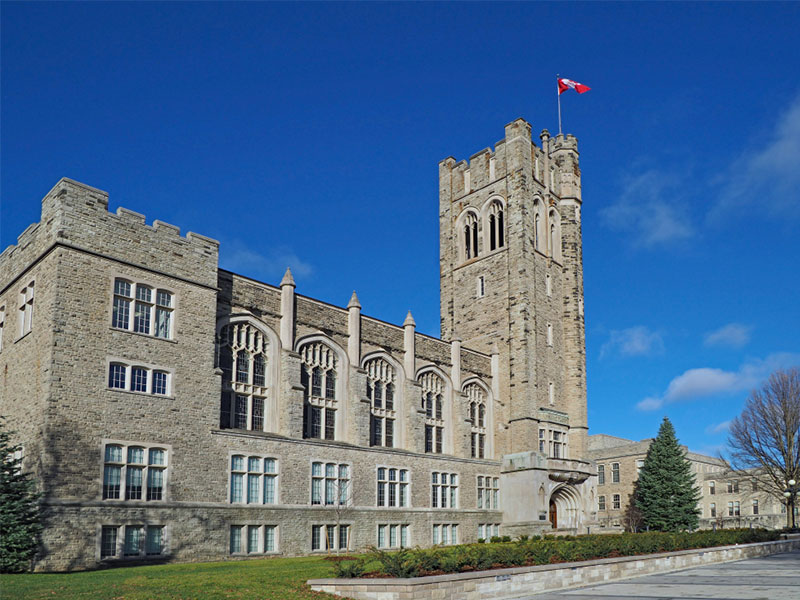Study in Canada
Top Canadian Universities and Get Professional Study Visa Guidance
Are you ready to study in Canada? With top-ranked universities and a wide range of academic programs, Canada is the ultimate destination for international students seeking Canada student visa opportunities. But navigating the application process can be overwhelming. That’s where Canada visa experts come in!
Our team specializes in Canada immigration pathways and Canada visa service, helping students like you achieve their academic dreams. Let us guide you through every step of your Canada study visa journey and unlock the doors to a world-class education in the Great White North!

Why Study in Canada?
Canada is a premier destination for international students seeking a top-notch education. Known for its exceptional education system, Canada offers a diverse and vibrant multicultural environment where students can thrive. With welcoming communities and inclusive settings, studying in Canada provides a unique opportunity for personal and academic growth. Experience world-class learning and an enriching cultural landscape by choosing Canada for your educational journey!

World-Class Education
Experience high-quality education from globally recognized institutions. Canada’s universities are renowned for their academic excellence and innovative teaching methods, providing you with a strong foundation for your career.

Work Opportunities
Gain valuable work experience with various post-graduate work options. Canadian policies allow international graduates to work in the country, providing an excellent pathway to launching your career globally.

Safe and Welcoming Environment
Study in one of the safest countries in the world. Canada is known for its friendly communities and inclusive atmosphere, ensuring you feel at home while pursuing your academic goals.

Diverse Cultural Experience
Immerse yourself in a vibrant multicultural society. Canada welcomes students from all over the world, offering a rich blend of cultures, languages, and perspectives that broaden your horizons and enhance your learning experience.
Education System in Canada
Study in Canada and experience a world-class education system that sets the standard for academic excellence. With a diverse range of public and private institutions, including colleges, universities, and vocational schools, Canada offers a flexible and comprehensive learning environment. From flexible course options to extensive support services, studying in Canada is designed to meet the needs and aspirations of international students. Whether you’re seeking a certificate, diploma, or degree, Canada provides a supportive and inclusive setting for academic success.
Primary Education in Canada
Education in Canada begins with primary schooling, typically starting at age 6. The curriculum focuses on foundational skills in literacy, numeracy, and social development, ensuring a well-rounded start for young learners.
Secondary Education in Canada
Secondary education (grades 9-12) provides students with a diverse curriculum, including academic, vocational, and elective courses. This stage prepares students for post-secondary education and encourages critical thinking, creativity, and independence.
Master's Study in Canada
Master's programs in Canada offer advanced studies in various fields, typically lasting 1 to 2 years. These programs combine coursework and research, providing students with expertise and skills necessary for leadership roles in their professions.
Post-Graduate Education
Post-graduate education, including doctoral and professional programs, emphasizes research and specialized knowledge. Canadian universities offer a supportive environment for students to engage in groundbreaking research and contribute to their fields.
Types of Degrees in Canada
Popular Degrees
Bachelor of Arts (BA)
Bachelor of Science (BSc)
Bachelor of Commerce (BCom)
Bachelor of Engineering (BEng)
Master of Business Administration (MBA)
Master of Science (MSc)
Master of Education (MEd)
Doctor of Philosophy (PhD)
Popular Study Programs
Computer Science
Nursing
Engineering
Business Administration and Management
Information Technology
Health Sciences
Social Work
Hospitality and Tourism Management
Admission Intakes in Canada
Canada offers multiple admission intakes throughout the year—Fall, Winter, and Spring—each providing unique opportunities for students aiming to enhance their education. The Fall intake is particularly popular, offering the largest selection of programs for aspiring students. By understanding these admission cycles, you can effectively plan your academic journey in Canada and navigate the Canada Student Visa process with ease. Whether you are considering options for Canada Immigration or looking for reliable Canada Visa Services, being well-informed about admission timelines is crucial for a successful transition to studying in Canada.
Fall Intake
The Fall intake is the most popular admission period in Canada, typically beginning in September. This intake offers a wide range of programs and is ideal for students looking to start their studies alongside peers from diverse backgrounds.
Winter Intake
The Winter intake starts in January and is a great option for students who may have missed the Fall intake. This period may have fewer program options but still provides opportunities in various fields.
Spring/Summer Intake
The Spring or Summer intake typically begins in May or June and is less common. This intake is often chosen by students looking for more specialized or shorter programs, as well as by those who want to fast-track their education.
Continuous Intake
Some institutions offer continuous intake programs, allowing students to apply at various times throughout the year. This flexibility is particularly appealing for online courses or part-time study options.
Top Universities in Canada
Undergraduate-Focused Universities
- Acadia University
- Mount Allison University
- Trent University
- Bishop’s University
- University of Prince Edward Island (UPEI)
Comprehensive Universities
- Simon Fraser University (SFU)
- University of Ottawa
- Université Laval
- York University
- University of Calgary
Research Universities
- University of Toronto
- University of British Columbia (UBC)
- McGill University
- University of Alberta
- University of Montreal
To gain admission to these top universities, students typically need:
Academic Qualifications:
- Completion of secondary school (high school) diploma or equivalent.
- A strong academic record, often with specific grade average requirements (e.g., 70% or higher).
Language Proficiency:
- Proof of English proficiency (IELTS, TOEFL, or equivalent) for non-native speakers.
- Some programs may also require proficiency in French, especially in institutions located in Quebec.
Application Documents:
- Completed application form (online or paper).
- Official transcripts from previous educational institutions.
- Letters of recommendation (may be required for certain programs).
Personal Statement or Essay:
- A statement of purpose or personal essay outlining the student’s goals and motivations for studying in Canada.
Additional Requirements:
- Some programs (e.g., engineering, health sciences) may have specific prerequisites or require entrance exams.
- A portfolio may be needed for programs in arts or design.
Visa and Immigration Documents:
- International students must obtain a Study Permit and may require additional documents to study in Canada.

22+ Years of Excellence
With 22+ years of experience, we’ve been guiding students to achieve their dream of studying abroad with trust and success.

96% Visa Success Rate
With a proven process and an exceptional visa success rate, we ensure the smooth journey of our students towards their overseas education goals.

Expert Faculties
Our certified & experienced trainers provide personalized coaching for IELTS, PTE, & other test preparations to ensure top scores.

Personalized Counseling
We offer tailored guidance to help you choose the right course, university, and country based on your career goals.
Start Your Canada Education Journey Today
Fill out the form, and our experts will guide you through the entire process—from admission to visa approval.
Top Courses to Study in Canada

Computer Science & IT
With a strong focus on AI, Machine Learning, and software development, these courses prepare students for high-demand careers in technology.

MBA & Business Management
Gain expertise in finance, marketing, and leadership from top business schools to accelerate your corporate journey.

Medicine & Healthcare
From MBBS to advanced research in medical sciences, the USA offers unparalleled opportunities in the healthcare sector.

Data Science & Analytics
Learn to harness the power of big data and analytics for decision-making and innovation.

Engineering
Explore specialized engineering fields with cutting-edge labs and industry partnerships.

Law
Study at renowned law schools, focusing on corporate law, international relations, and legal frameworks.
Cost of Living and Studying in the Canada
When considering studying in Canada, it’s essential to understand the cost of living and associated expenses. Canada is known for its high-quality education and vibrant student life, but it’s important to budget effectively for your time here. Factors such as tuition fees, housing, and daily living expenses can vary significantly based on the city and lifestyle you choose. By gaining insight into these costs, you’ll be better prepared to manage your finances and make the most of your educational experience in Canada. Whether you are here on a Canada Student Visa or exploring options for Canada Immigration, having a clear understanding of your financial commitments is a key step in your academic journey.
Tuition Fees in USA
Public Universities
Annual Tuition Cost: $7,000 - $29,000
Public universities in Canada provide a more economical option for international students compared to private institutions.
These universities receive government funding, which allows them to keep tuition fees relatively low. However, costs may vary significantly depending on the province and the specific institution. Generally, international students can expect to pay between CAD 7,000 and CAD 29,000 annually, depending on their program of study.
Private Universities
Annual Tuition Cost: $20,000 - $50,000
Private universities in Canada tend to have higher tuition fees, ranging from CAD 20,000 to CAD 50,000 per year.
These institutions often offer specialized programs and smaller class sizes, which can enhance the educational experience. However, prospective students should consider that the investment in a private education may lead to unique opportunities and resources that could benefit their career in the long run.
Living Expenses in Canada
Average Annual Living Costs:
$10,000 – $15,000
Studying in Canada offers a world-class education, but understanding the average annual living costs is essential for effective financial planning. On average, international students can expect to budget between CAD 10,000 and CAD 15,000 per year for living expenses. However, these costs can vary widely based on the city you choose to live in and your personal lifestyle. Below is a detailed breakdown of typical living costs that students may encounter while studying in Canada, ensuring you are well-prepared for your educational journey.
Housing
CAD 500 - CAD 1,500 per month
Housing is one of the largest expenses for international students studying in Canada. Costs can differ significantly depending on whether you choose on-campus residence, shared apartments, or private rentals. Major cities like Toronto and Vancouver typically have higher rental costs, while smaller cities may offer more affordable options. Consider student housing, which often includes utilities and amenities, as a budget-friendly choice.
Food
CAD 300 - CAD 600 per month
Food expenses can vary based on your eating habits and cooking preferences. On average, students can expect to spend between CAD 300 and CAD 600 per month on groceries and dining out. Cooking at home can help you save money and keep your food budget in check. Exploring local markets and budget grocery stores can also provide cost-effective food options.
Transportation
CAD 80 - CAD 150 per month
Transportation costs depend on your location and how you plan to commute. If your university is located in a city with an extensive public transportation system, consider student discounts for monthly passes. On average, you can expect to spend between CAD 80 and CAD 150 per month on transportation. Alternatively, biking and walking are cost-effective options for getting around.
Health Insurance
CAD 600 - CAD 1,200 per year
Health insurance is a fundamental expense for international students studying in Canada. Each province has its own healthcare system, and students are often required to enroll in a health insurance plan. Depending on the province, you may expect to pay between CAD 600 and CAD 1,200 annually for health coverage. Ensure you understand your health insurance options before arriving in Canada.
Textbooks and Supplies
CAD 500 - CAD 1,000 per year
Academic materials, including textbooks and supplies, can add to your educational expenses. On average, students can budget between CAD 500 and CAD 1,000 per year for this category. Look for used textbooks, digital resources, and library options to minimize costs. Many universities also offer book rental programs to help ease the financial burden.
Personal Expenses
CAD 100 - CAD 300 per month
Personal expenses encompass various categories, including clothing, entertainment, mobile phone plans, and social activities. Depending on your lifestyle, you may budget between CAD 100 and CAD 300 per month for personal expenses. Keep track of your spending and look for student discounts to help manage costs.
Admission Process in Canada
Step-by-Step Guide to the Admission Process
Navigating the admission process for studying in Canada can be overwhelming for international students, but breaking it down into manageable steps can simplify the experience. Canada boasts a wide array of reputable institutions that offer diverse programs tailored for students from all backgrounds. From preparing your application to receiving your acceptance letter, this comprehensive guide will walk you through the essential steps of the Canadian admission process. By following these steps, you’ll be well-equipped to achieve your academic goals and successfully secure your Canada Student Visa. Dive into the details and prepare for an enriching educational journey in Canada!
1Research and Select Programs
Timeline: 6-12 months prior to application
Before applying, it's crucial to conduct thorough research on Canadian universities and programs that align with your interests and career goals. Consider factors such as program curriculum, university reputation, location, and tuition fees. Shortlist your preferred institutions and gather all relevant information about their admission requirements.2Prepare Required Documents
Timeline: 4-6 months prior to application
Once you’ve selected your desired programs, prepare the necessary documents. Common requirements include academic transcripts, letters of recommendation, a statement of purpose, and proof of English language proficiency (such as IELTS or TOEFL scores). Be sure to check the specific requirements for each institution, as they may vary.3Submit Applications
Timeline: 3-5 months prior to the application deadline
Apply online through the university’s official website or through a centralized application system, if applicable. Ensure that you meet all deadlines and double-check that all documents are submitted correctly. Most universities in Canada have application deadlines ranging from January to March for programs starting in September.4Track Application Status
Timeline: 1-3 months after submission
After submitting your application, monitor your application status through the online portal provided by the university. Some institutions may require additional information or interviews, so stay attentive to any communication from them. It’s advisable to regularly check your email for updates.5Receive Admission Offers
Timeline: 1-3 months after application submission
Once the admissions committee has reviewed your application, you will receive notifications regarding acceptance, rejections, or waitlist statuses. Successful applicants will typically receive an official offer of admission, which may include conditions that must be met before enrollment.6Confirm Enrollment and Pay Tuition Deposit
Timeline: 1 month after receiving the offer
Upon receiving your offer, confirm your acceptance of the program by following the outlined instructions. This often includes signing an acceptance letter and paying a tuition deposit within the specified timeframe. This step secures your place in the program and allows you to proceed with the next steps.7Apply for a Study Permit
Timeline: 2-3 months before your program starts
With your confirmation of acceptance, you can apply for a Canadian study permit. Gather the necessary documents, including your acceptance letter, proof of financial support, and identification. Submit your application online or at a local Canadian visa application center, and ensure you apply well in advance to avoid delays.
Entrance Exams Required to Study in Canada
When planning to study in Canada, understanding the required entrance exams is crucial for international students. Many Canadian universities mandate specific standardized tests to evaluate applicants’ knowledge and readiness for diverse academic programs. These exams play a vital role in helping institutions assess whether candidates have the necessary skills to succeed in their chosen fields of study. In this section, you will find comprehensive descriptions of the most common entrance exams required for admission to Canadian universities. This guide will equip you with the information needed to navigate the testing requirements and enhance your application for a successful academic journey in Canada.
TOEFL/IELTS - English Proficiency
TOEFL (Test of English as a Foreign Language) and IELTS (International English Language Testing System) are standardized tests designed to assess English language proficiency for non-native speakers. Most universities require these scores to ensure that students can effectively communicate and understand coursework. A strong score in these tests is often essential for admission.
PTE - Pearson Test of English
The Pearson Test of English (PTE) is another option to demonstrate English proficiency. Like the TOEFL and IELTS, the PTE assesses your reading, writing, listening, and speaking skills. It's increasingly accepted by many institutions as an alternative measure of English language ability. With a comprehensive format, it provides a reliable indication of your language skills in an academic setting.
GRE/GMAT - Graduate Admissions
The GRE (Graduate Record Examination) and GMAT (Graduate Management Admission Test) are standardized tests commonly required for admission to graduate programs. The GRE assesses general academic readiness, while the GMAT is specifically geared toward business school applicants. A strong performance on these exams can enhance your application and demonstrate your readiness for advanced study.
SAT - Scholastic Assessment Test
The SAT is primarily used for undergraduate admissions in universities across Canada, especially for students from the United States. This standardized test assesses reading, writing, and math skills. Many universities accept SAT scores as part of their admissions criteria, and students should check with individual institutions to confirm their requirements.
Visa Requirements for Studying in the Canada
Studying in Canada offers a wealth of academic opportunities, but it also comes with the responsibility of obtaining the proper visa. International students planning to pursue their education in Canada must apply for a Canada Student Visa / Study permit, which allows them to attend designated learning institutions (DLIs) in the country. Understanding the visa requirements is crucial for a successful application process. Below are the key details and necessary documents involved in obtaining a study permit to study in Canada.
Study Permit
The study permit is an official document issued by the Canadian government that allows foreign nationals to study at recognized institutions in Canada. To obtain a study permit, you must first secure an acceptance letter from a DLI. The study permit is generally valid for the duration of your program, plus an additional 90 days to allow for departure from Canada.
Acceptance Letter
To apply for a study permit, you must provide a valid acceptance letter from a designated learning institution in Canada. This letter should include details such as the program name, start date, and duration of the course. It's vital to ensure that the institution you are applying to is recognized as a DLI as only these institutions can enroll international students.
Proof of Financial Support
Applicants must demonstrate sufficient financial resources to cover tuition fees, living expenses, and return transportation while studying in Canada. This can include bank statements, scholarship letters, or affidavits from sponsors. The exact amount required varies but it's important to show that you can support yourself throughout your studies.
Passport and Identification
A valid passport is mandatory for obtaining a study permit. Your passport must remain valid for the entire duration of your stay in Canada. Additionally, you may be required to provide other forms of identification, such as national identity cards or birth certificates, as part of the application process.
Medical Exam and Background Check
Depending on your home country and the length of your intended stay, you may need to undergo a medical examination to ensure you meet Canada’s health standards. Additionally, a background check may be required, especially if you have stayed in other countries for more than six months. Applicants may also need to submit police clearance certificates to confirm their legal standing.
Biometrics
Most applicants will need to provide biometrics (fingerprints and a photograph) as part of the application process. Biometrics help the Canadian government verify your identity and enhance security. You’ll receive instructions on where to submit your biometrics after you submit your study permit application.
Scholarships in Canada
Canada offers a wide range of scholarships for international students seeking to pursue higher education. These scholarships can significantly alleviate the financial burden of tuition fees and living expenses, making study in Canada more accessible. Here are four prominent scholarships available to international students in Canada.
Vanier Canada Graduate Scholarships
The Vanier Canada Graduate Scholarships are aimed at attracting and retaining world-class doctoral students. Valued at $50,000 per year for three years, these scholarships are awarded to students who demonstrate leadership skills, research excellence, and academic achievement. Eligible candidates must be nominated by a participating Canadian institution.
Canada Graduate Scholarships – Master’s Program
The Canada Graduate Scholarships – Master’s Program supports high-caliber master’s students pursuing their degrees at Canadian universities. With a value of $17,500 for a 12-month period, these scholarships are intended for students who demonstrate a high level of achievement in undergraduate studies. Candidates must apply through the relevant granting agencies.
Pierre Elliott Trudeau Foundation Scholarships
The Pierre Elliott Trudeau Foundation offers scholarships for international students pursuing doctoral studies in the social sciences and humanities. The scholarship provides a generous award of up to $60,000 per year, which includes funding for travel, a research and networking grant, and mentorship. This scholarship focuses on academic excellence, leadership, and community involvement.
University-Specific Scholarships
Many Canadian universities offer their own scholarships for international students, which can vary widely in terms of eligibility, amounts, and requirements. These scholarships may be merit-based, need-based, or awarded based on specific criteria related to the student's field of study. Students should check with their chosen institution for unique opportunities and application procedures.
Top Cities to Study in the Canada
Canada is home to many vibrant cities that offer excellent educational opportunities for international students. Each city has its unique charm, culture, and academic programs, making them desirable locations for studying abroad. Here are some of the top cities in Canada for international students:

Toronto, Ontario
Toronto, Canada’s largest city, is a bustling metropolis known for its multicultural atmosphere and diverse population. Home to top-ranking universities such as the University of Toronto and Ryerson University, Toronto offers a wide range of programs and disciplines. The city boasts an abundance of cultural attractions, vibrant neighborhoods, and professional opportunities, making it an ideal place for students to study and thrive.

Vancouver, British Columbia
Vancouver is renowned for its stunning natural beauty and mild climate. It attracts students from around the globe, thanks to its highly rated institutions, including the University of British Columbia and Simon Fraser University. The city's strong emphasis on sustainability and innovation, combined with its vibrant arts scene, outdoor recreational activities, and scenic views, provides an exceptional environment for academic pursuits and personal growth.

Montreal, Quebec
Montreal is a unique blend of European charm and North American spirit, offering a rich cultural experience for international students. Known for its bilingualism (French and English), this city hosts institutions like McGill University and the Université de Montréal, which are celebrated for their research and academic programs. Montreal's lively festivals, culinary scene, and eclectic neighborhoods make it a culturally enriching place to study.

Ottawa, Ontario
As Canada’s capital, Ottawa is a city filled with history, culture, and political significance. It is home to reputable universities, such as the University of Ottawa and Carleton University. Students in Ottawa can enjoy a balanced lifestyle, with vast parks, museums, and historical landmarks. The city also offers numerous internship and co-op opportunities, especially for those interested in politics, international relations, and public administration.

Calgary, Alberta
Calgary is known for its friendly atmosphere and proximity to the stunning Canadian Rockies. The city features institutions like the University of Calgary and Mount Royal University, offering robust programs in engineering, business, and health sciences. Calgary's booming economy, particularly in sectors like energy and technology, provides students with ample networking and job opportunities, making it an attractive choice for those looking to build their careers after graduation.

Halifax, Nova Scotia
Halifax is a vibrant coastal city that combines a rich maritime culture with a strong academic environment. Institutions such as Dalhousie University and Saint Mary’s University offer diverse and high-quality educational programs. Known for its friendly community, Halifax is an excellent place for students seeking a supportive and engaging atmosphere. The city's scenic waterfront, historic sites, and a plethora of outdoor activities enhance the overall student experience.
Top Careers in Canada
Canada’s job market is diverse and dynamic, offering numerous career opportunities across various sectors. With a strong economy and a focus on innovation and growth, certain professions are in high demand. Here are some of the top careers in Canada, highlighting their importance and potential for growth:
Software Developer
As businesses embrace digital transformation, software developers are in high demand. They design and create applications to enhance efficiency and user experiences, particularly in tech hubs like Toronto and Vancouver. This career promises competitive salaries and remote work options.
Registered Nurse
With an aging population, registered nurses are essential in healthcare. They deliver critical care and wellness support across various settings, offering job security and opportunities for specialization and growth in this rewarding field.
Data Scientist
Data scientists analyze complex data to provide insights that drive business strategies. The demand for these professionals continues to rise in the age of big data, offering attractive salaries and the chance to work in various industries.
Financial Analyst
Financial analysts guide organizations in making informed investment, budgeting, and financial planning decisions. They play a crucial role in navigating complex financial landscapes across sectors like banking and corporate finance. This in-demand position offers competitive compensation and opportunities for career advancement through certifications and education.
Healthcare Administrator
Healthcare administrators manage operations in hospitals and clinics, ensuring quality patient care and efficient services. This role offers stability and competitive pay, making it essential as the healthcare sector expands.
Artificial Intelligence Engineer
AI engineers design algorithms that allow machines to perform tasks requiring human intelligence. As AI technology advances, this role is crucial across industries. Strong skills in machine learning and programming are necessary, with high earning potential and innovative opportunities.
Testimonials
Trusted by Thousands,
Loved by Many
Thanks to Dhrron Consultancy, our dream of visiting New Zealand became a reality. Their immigration consultants provided us with all the support we needed for our visitor visa process.
Sandip & Sneha Patel
Dhrron Consultancy helped us secure a visitor visa to the USA without any hassle. Their professionalism and attention to detail were outstanding. Thank you!
Narendra & Renu Singh
Choosing Dhrron Consultancy for my student visa to Canada was the best decision. Their 21+ years of experience and dedication to their clients ensured my success!
Krupa Patel
Dhrron Consultancy made my Canada student visa process quick and efficient. Their excellent guidance and top-notch services gave me confidence every step of the way.
Alap Dave
Getting my student visa for Canada was a hassle-free experience, thanks to Dhrron Consultancy. Their study abroad consultants in Vadodara are truly experts in the field!
Himanshu More
Dhrron Consultancy helped me achieve my dream of studying in Canada with a seamless student visa and college admission process. Their professional team and personalized counseling made all the difference!
Dhyey Patel
I’m so grateful to Dhrron Consultancy for helping me secure an open spouse dependent work permit for Canada. Their expert visa consultants guided me every step of the way, making the process smooth and stress-free. Highly recommended!
Daksha Chovatiya
Start Your Canada Journey Today
Fill out the form, and our experts will guide you through the entire process—from admission to visa approval.
FAQs
Answers to Common Questions
To study in Canada, you typically need:
- A valid study permit (student visa).
- Proof of acceptance from a recognized Canadian educational institution.
- Proof of sufficient funds to cover tuition, living expenses, and return transportation.
- A medical exam (in some cases) and police clearance certificate.
You can apply for a study permit online or through a paper application. You'll need to provide your letter of acceptance, proof of funds, and other necessary documents. Be sure to apply well in advance of your intended start date.
Tuition fees vary by program and institution, typically ranging from CAD 7,000 to CAD 29,000 annually. Additionally, consider living expenses, which can range from CAD 10,000 to CAD 15,000 yearly, depending on the city.
Yes, international students in Canada can work part-time on-campus or off-campus without a work permit, provided they hold a valid study permit and are enrolled in a full-time program.
You may apply for a Post-Graduation Work Permit (PGWP), allowing you to work in Canada for up to three years post-study, depending on the length of your program.
Yes, many provinces offer healthcare coverage for international students. However, coverage varies, so check specific provincial regulations and consider obtaining health insurance.


